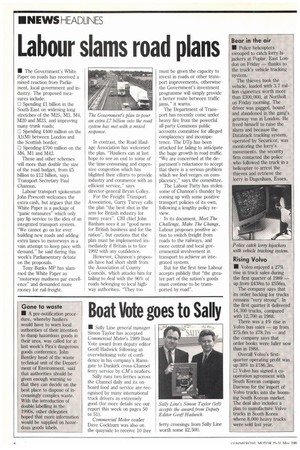Labour slams road plans
Page 8

If you've noticed an error in this article please click here to report it so we can fix it.
• The Government's White Paper on roads has received a mixed reaction from Parliament, local government and industry. The proposed measures include: 0 Spending V. billion in the South East on widening long stretches of the M25, M3, M4, M20 and M23, and improving many trunk roads; C Spending £400 million on the Al(M) between London and the Scottish border; o Spending £700 million on the M6, MI and M42.
These and other schemes will more than double the size of the road budget, from £5 billion to 212 billion, says Transport Secretary Paul Channon.
Labour transport spokesman John Prescott welcomes the extra cash, but argues that the White Paper is a package of "panic measures" which only pay lip service to the idea of an integrated transport system. "We cannot go on for ever building new roads and adding extra lanes to motorways in a vain attempt to keep pace with demand," he said during this week's Parliamentary debate on the proposals. Tony Banks MP has slammed the White Paper as "motorway madness par excellence" and demanded more money for rail-freight. In contrast, the Road Haulage Association has welcomed the plan. "Hauliers can at last hope to see an end to some of the time-consuming and expensive congestion which has blighted their efforts to provide industry and commerce with an efficient service," says director-general Bryan Colley. For the Freight Transport Association, Garry Turvey calls the plan "the best shot in the arm for British industry for many years". CBI chief John Banham sees it as "good news for British business and for the nation", but cautions that the plan must be implemented immediately if Britain is to face 1992 with any confidence. However, Channon's proposals have had short shrift from the Association of County Councils, which attacks him for failing to deal with the 96% of roads belonging to local highway authorities. "They too must be given the capacity to invest in roads or other transport improvements, otherwise the Government's investment programme will simply provide a better route between traffic jams," it warns. The Department of Transport has recently come under heavy fire from the powerful all-party Commons public accounts committee for alleged complacency and incompetence. The DTp has been attacked for failing to anticipate the huge growth in road traffic. "We are concerned at the department's reluctance to accept that there is a serious problem which we feel verges on complacency," says the committee. The Labour Party has stolen some of Channon's thunder by coming up with some positive transport policies of its own, following a lengthy policy review.
In its document, Meet The Challenge, Make The Change, Labour proposes positive action to switch freight from roads to the railways, and more central and local governmental involvement in transport to achieve an integrated system. But for the first time Labour accepts publicly that "the greater part of the nation's goods must continue to be transported by road".












































































































